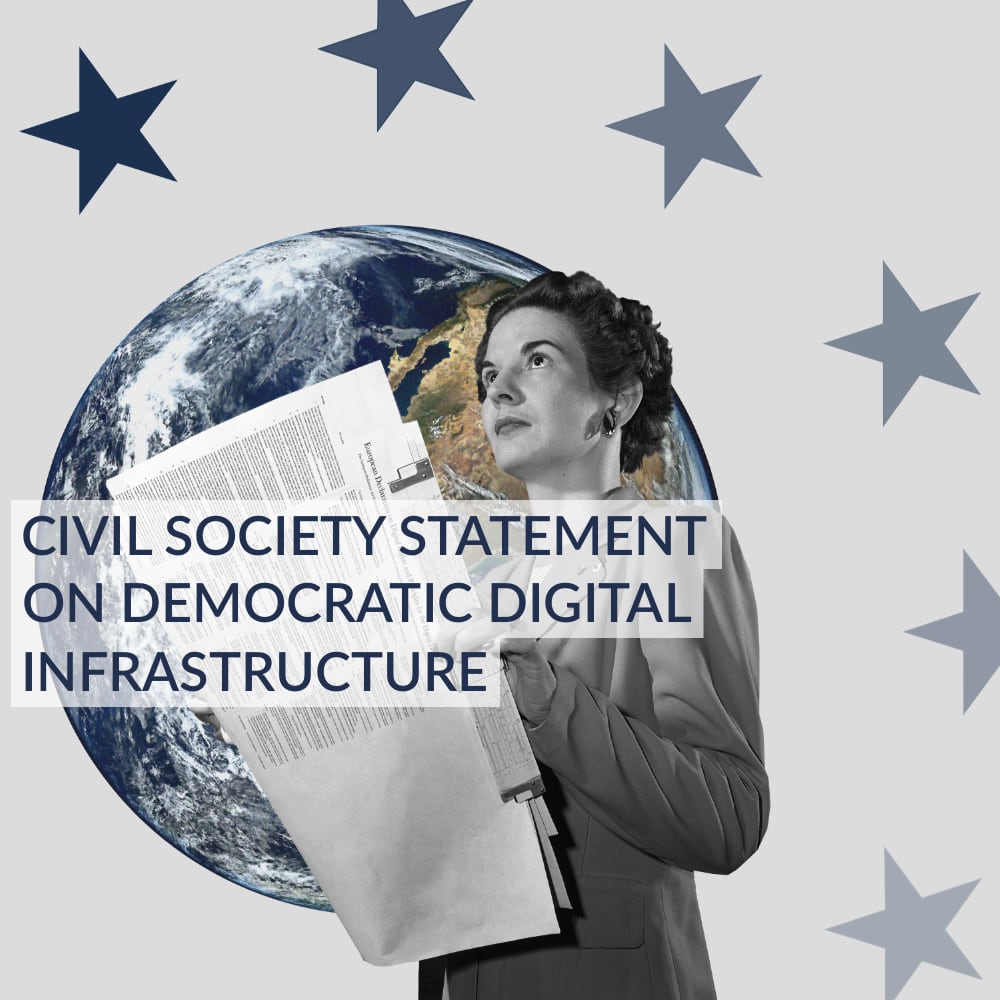
In December 2022, the European Parliament, the Council, and the European Commission signed the European Declaration on Digital Rights and Principles for the Digital Decade. This Declaration sets out principles for shaping the European digital space in the years to come.
We welcome that the Declaration recognizes the importance of broad “participation in the digital public space” and of “fair and just working conditions.” Also, we welcome the attention to sustainability and the need to avoid environmental harm. All this reflects the growing recognition that there is a need for alternatives to the dominant commercial platforms and the extractive practices that dominate the online environment today. We also welcome the fact that the declaration calls for “promoting interoperability, transparency, open technologies and standards as a way to further strengthen trust in technology as well as consumers’ ability to make autonomous and informed choices”.
We share the ambition expressed in the declaration “to promote a European way for the digital transformation, putting people at the centre, built on European values and EU fundamental rights, reaffirming universal human rights, and benefiting all individuals, businesses, and society as a whole” and urge the EU to take concrete steps towards realising these objectives and ambitions. Ambitions that must also guide Europe’s digital cooperation with the rest of the world.
To create more socially-oriented and climate-friendly digital spaces and ensure the sovereignty of communities and our societies as a whole, Europe needs to invest in digital commons and public digital infrastructures. The need for values-based innovation and transformative investment is evident in the domains of education and science, public service media, care, and in our economy overall.
Building Digital Public Spaces that can function as alternatives for the centralised, dominant commercial platforms of today must be at the core of the European Union’s digital policies in the coming years.
As a concrete first step — that builds on ongoing efforts in a variety of member states and other actors, such as the recent report by the European working group on the Digital Commons — the EU and its Member States should set up a European Public Digital Infrastructure fund designed to support Digital Public Spaces and to democratise the digital transition. This fund should be tasked with supporting the development and maintenance of digital public infrastructure that delivers public value by providing citizens and institutions with alternatives to commercial digital infrastructures. These alternatives must:
- Create public value, by empowering public institutions and the commons
- Increase the digital sovereignty of communities and societies
- Adhere to democratic and collective forms of governance.
- Use open standards and embrace interoperability as a design principle
- Be based on free and open-source software
- Ensure privacy by default and by design
- Adhere to EU net neutrality rules
- And contribute to a regenerative economy
The creation of a European Public Digital Infrastructure Fund will be an important next step towards a policy programme for realising a just digital transition towards socially-oriented and climate-friendly digital spaces.
Some of these sovereign digital spaces are already here or in active development, such as Mastodon, PeerTube, and ActivityPub, the technical standard they use. Those spaces, together with core technologies, such as a public browser engine or a public interest open search index, require a European Public Digital Infrastructure fund to further grow and flourish.
With that, it will also be an important step towards the objectives expressed in the European Declaration on Digital Rights and Principles for the Digital Decade[1].
As organisations representing civil society we see our task to develop additional proposals that put the principles and objectives of the declaration into action. We urge Member states and the Commission to start exploring avenues towards such a Fund as soon as possible. We are fully committed to co-create and be part of such a process.
Signatories:
- AI forensics
- Commons Network
- Collectif Société des communs
- Center for Internet and Society of CNRS
- Centre for Research on Multinational Corporations (SOMO)
- CoopTech Hub Poland
- Coop des Commun
- Corporate Europe Observatory
- Defend Democracy
- DisCO.coop
- European Big Blue Button Association – eBBBa e.V.
- European Digital Rights (EDRi)
- European Public Service Union (EPSU)
- Fair Vote UK
- Free Knowledge Advocacy Group EU
- Open Future
- Open Knowledge Foundation
- Platformcoops Germany
- Polish Economics Network
- Public Spaces
- Platoniq
- SUPERRR Lab
- Verband Freier Rundfunk Österreich
- Waag Futurelab
- Wikimedia Deutschland
- Wikimedia France
- Open Fisca
- Open Terms Archive
[1] The European Public Digital Infrastructure Fund as envisaged here should not be confused with efforts by the telecom industry to change the business model of the internet to a two sided market.








